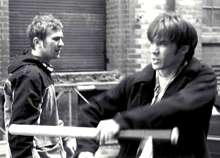
You avoid any crime glamour, you remain true to the community you know, you show it in detail, but how do you engage your non-Polish audience? What holds them to the film, makes them tell their friends they should see it?
As I said, it’s a universal story. It’s a movie! I am trying to entertain so I hope people care about the characters and want to know what happens next. I think films can be educational, entertaining and artistic all at the same time. They are about PEOPLE and how they react to the situations that spring up around them. Films take you places you couldn’t possibly go or experience. That’s why I love films and that’s the kind of films I want to make. I hope Small Time Obsession does all those things but, most of all, I want to create an emotional response, good or bad, so the worst thing that can happen is that it leaves you cold and there is no reaction at all.
Now while you were working on developing Small Time Obsession, you were also producing a second feature-length film The Killing Zone.Was that another low budget production and how did it work out, two together, as it were?
I actually co-produced and edited The Killing Zone but, as I am not involved in the company that produced the film outright, legally, I am not at liberty to talk about their finances or how the film was funded or distributed. What I can say though is that it was a great example of how you can work together to get your films made.The writer/director Ian Diaz asked me to produce The Killing Zone for him but I declined at first, as I was producing Small Time Obsession at the time. Nevertheless, what we agreed to do was share resources.I offered to edit the film for him and, in return, he offered to help me with the development of my script. I had already cast some of my lead actors and he ended up using three of them as well. He contacted a stunt company, which then also did the stunts on my film. He used locations and rehearsal rooms that I had organised for my film. We did camera deals and lab deals as two films rather than one and so on.

Even though The Killing Zone did not get a theatrical release in the UK, it was released on video and DVD and is now being released on video in the US. This means I have credits on two films rather than one and so have they. We both had two chances at success and, in the end BOTH have been successful. It could not have worked out better. The one thing I would say though is that you have to be very sure of the people you are working with because it is possible that other people could abuse your trust and goodwill.I don't mean to be cynical but when it comes to any kind of business, you can't really trust anyone, so check them out and try them out. The minute someone lets you down or doesn't keep a promise then be very wary. If it happens again, drop them immediately. In the end, your future is too valuable for you to trust it to someone else so please be careful. This has been my experience and, on the whole, I have been too trusting too often.There are excellent people out there who will help you unconditionally and then there are others who will try to take you for everything you've got. They will smile at you, look you in the eye and LIE to you. Personally, I think it is very sad and totally unnecessary, but there are a lot of selfish people out there and, unfortunately, it's just the way it is.

Use your gut feelings. Every time I didn't listen to mine, I regretted it.
That sounds like very sensible, basic advice. Intuitive feelings can be very revealing. Back to your own Small Time Obsession then. Next you took your film to the film market at the Edinburgh International Film Festival. That was crucial to moving up to a 35mm print I believe.
I shot on s16mm film, transferred everything to videotape and edited digitally on AVID. The beauty of editing digitally was that I did not have to cut my negative until I knew I had interest from a distributor. Why go to the expense of making a print unless you know you are going to get it shown?Anyway, I didn’t have the money and Edinburgh does this great thing called NBX, I think it’s called FilmUK now. They list every UK film that has been made in the previous year, from a film like "Notting Hill" to the lowest of low budget video movies.They produce a booklet, which has all the films’ details, and this is made available to all the buyers, sales agents and distributors at the festival. They then flick through the booklet and if there is something they like they can watch it in a special video viewing room, which stocks a couple of copies of every film. No pressure. This is where my distributor saw my film.
That was David Nicholas Wilkinson of Guerilla Films. He was crucial to finishing the movie as well as marketing it. What was his role at this stage?
He helped raise a further £150,000 to finish the film to 35mm print. I had shot on Super16 and transferred everything to video. All I had at this point was a virtual film if you like, it didn't exist in print form at all, just on Digibeta. The extra funding covered a re-cut, neg cut, blow-up, sound mix, music clearances, E&O insurance then telecines etc, etc, etc.
Where did you and your distributor go to find funding like that at this stage?
The £150,000 came from a private investment in the form of venture capital. This was a unique situation because I went to them with a finished film (on Digibeta) and with a UK distributor already attached. Normally, if you went to them for initial funding, you would not have a leg to stand on because you cannot prove you have a market for your film. Having a distributor can change that situation. After all, in your circumstances, you haven't made a film before and so no one can believe you.
So a distributor involvement opens doors then. What’s your pitch in getting people to invest in your project? What angle are you coming from when you want to try and get their support?
When approaching money or facilities, ask yourself why YOU would part with the money or why YOU would help a project like this one. Put yourself in their shoes.Look at it logically. Why should I give you £500,000 to make your film if you have never made a film before? Would you give someone £500,000 if they had never made a feature before?

You are not a charity and nor is anyone else. Someone gives you money, they expect it back and then some. Remember they don't know who you are; they might as well give it to someone on the street. I got my money and help from people that KNEW ME. They invested in ME and not the project.
Cannes, you went there to promote it. How did that go?
Once I signed with Guerilla Films, they raised the necessary money to finish the film to 35mm. I then started showing the film to overseas sales agents. Quite a few were interested because I already had UK distribution. In the end, I finally chose to go with J&M Entertainment and they launched the film to overseas buyers at Cannes 2000.It was shown twice at the Star cinema in Cannes. That was a great moment. In fact, the whole Cannes experience was fantastic. As you can imagine, the pressure was off. I had a sales agent selling the film from the best suite in the best hotel in Cannes, the Carlton Hotel, and I was there to promote the UK theatrical release with all my lead actors. It was work and a holiday all rolled into one and if you love films, you’ve got to love Cannes! I could have stayed there a month. It was the best time. As a result of Cannes, the film was featured on CNN and Carlton TV’s "London Tonight" on its release in the UK.
You got a first screening in London and got your week extended to two! That was a result, was it not? How did you set up that screening in the first place?
All you really have if you are a small, independent film is word-of-mouth. You don’t have the benefit of a multi-million dollar advertising campaign like all the US films. So, in comparison, we did REALLY well. In fact, per print, we were actually doing a lot better than most US films.This is what people tend to forget when they look at box office takings. £1,000 on one print is actually a better return than £10,000 on 100 prints. "Small Time Obsession" was released on four prints in London and around the country through ABC Cinemas, Warner. They liked it and took it but I don’t for one minute think it was that easy.
Small Time Obsession is out now on DVD. You urge renting and buying it to demonstrate something that could help other filmmakers. How does that help?
The thing is that, like it or not, filmmaking is a business and if you make someone money they will come back for more. If filmmakers want cinemas or video shops to take more small, independent UK films, they will have to prove that there is a market for these films.If no one goes to see these films in the cinema, no one rents them from the video shop and no one buys them on DVD, then why would the cinemas and the shops want another one. It’s obvious really. If "Small Time Obsession" does well, it makes things easier for the next independent UK film that comes along. If it does badly, it makes it more difficult.Like it or not, we’re all in this together. I was a victim of this in my own way. A number of critics gave my film poor reviews because they saw it as just "another" gangster film. This happened because it came out after "Lock, Stock" and at the same time as stuff like Circus", "Gangster No1 and Love, Honour & Obey.Now, not only is Small Time Obsession NOT a gangster film but it has taken me almost five years to make and get it to the screen. Five years ago, no one was making UK gangster films at all.How is it my fault then, that in the meantime, "Lock, Stock" opens, proves top be a huge success, then spawns a whole spate of other gangster films made and released to try to latch on to Guy Ritchies’ success?Small Time Obsession suffered as a result and I doubt if there is anyone now who would want to release a UK gangster film. In simple terms, all other films directly affect your own film’s success. Therefore, it is in every UK filmmaker’s interest that UK films are successful so I’d say every UK filmmaker should go and see every UK film that comes out. It would make a HUGE difference.Unfortunately, they don’t. They go and see US films and then complain that no one goes to see UK films. If they don’t, and it’s in their interest, why should anyone else?

There’s no profit to be found in a two week theatrical release presumably, but what about sales on DVD? Is there a profit to be found there?
I am out on video and DVD but I am still spending money. The key thing here is, a UK distributor cannot make money on UK films. My distributor did not pay me for my film. He raised the money we needed to finish and release the film. The reason he did it is because he now has a cut of overseas sales. Without that, he would not have taken the film at all. You will not make any money in the UK. You have to believe that.The UK is simply a platform for the rest of the world. You have to be aware of that.
So what are the hurdles you face in getting your film a theatrical release?
Let me explain a cinema release. It is constantly reported that UK films do badly in the cinema but the reality is that it is amazing that any of them manage to get to a cinema in the first place. Yes, the quality of the film is important but what is MORE important is the marketing.Logically, how can any UK film compete with a US film? Every single US film released here has already been released in the US and has already benefited from that US publicity being followed by filmgoers over here, before UK release!That's why Four Weddings was successful; it opened in the US, became a hit in the US, THEN opened here.Then there are the cinemas; you are given a week, which is, in fact, only three days (the opening weekend) and if you don't outplay the US films, you are out. To compete with these US films, you first need to spend the same amount as they do on advertising, as you can have the best film in the world but, if no one knows its playing, it means nothing.Second, you need great reviews because, unlike the US films, you haven't had any yet and we all know how hostile some critics can be to anything home-grown. Look at Lock, Stock and Trainspotting very carefully; great campaigns and great awareness but that didn't come cheap and look at the names involved in producing the film.
And that's the point I'm trying to make. Its not that distributors do not WANT to spend money on distributing UK films, its just that they KNOW they won't get their money back. That's a fact. Again, look at how you choose to go and see a film. When Small Time Obsession was released, there were about 25 other NEW films released that same month just in the cinema. Now, I love films but even I only see 3 or 4 films a month in the cinema.Furthermore, it costs the same amount of money to go see my film as it does Gladiator. Like it or not, you are in direct competition with Gladiator and, yes, you can offer something Gladiator doesn't but, again, without the advertising, you can't tell anyone what that is. All you have is word-of-mouth but that only spreads once people have seen the film.
Unfortunately, you have been kicked out of the cinema because not enough people knew about the film to come see it on the opening weekend because you didn't have the advertising spend. As a result, the film gets low box office figures and then the next UK film that comes along is told that it is not worth spending anything on advertising it because no one went to see the last UK film that came out and so the same thing happens. Catch 22. Now, no one can afford to take the risk.
With practically no advertising budget, compared with some big budget films, does getting news publicity help or not?
Let me put it this way. When Small Time Obsession was released as a film, through Shooting People, newspaper and television publicity, lots of people must have known it was out in the cinema? How many went to see it?For a small, independent film, I actually got a lot of great publicity, especially in the film press, on London Tonight, CNN and in the Evening Standard. Were you aware of it? I hope so but probably not. It gets lost.I say all this just to underline what you are up against and it's not pretty. It's competition and, most of the time, it is NOT fair but that's the reality and you have to know what you, and the distributors, are up against.Only when you know the truth can you do anything about it because, I believe that, having said all this, it is possible to beat the system. Make a great film and do great marketing.
Unfortunately, that is what everyone is trying to do and, as you know, there is no formula. All you can do is get stuck in. I tried and never thought I would get this far.. but you have to work together. If everyone who reads Shooting People had gone to see my film when it opened, it would have blown the cinemas away. They weren't expecting anyone to come. As it is, I got a second week because it did so well.That is the first step. Make someone some money and they will come back for more. Whether you think Small Time Obsession is good or not, you have the power to help both me and yourselves right now by either renting or buying Small Time Obsession.

That is a bit of nifty direct marketing! A plug, if ever I heard one Piotr!
Yes, but not just for me…. For all low budget UK films. If mine rents well, the video shops will be more likely to give the next UK film a chance. You all have a vested interest because you want to make those NEXT films. If you don’t help, then who will? This is what I mean.
Advice to the new filmmaker? …Apart from buying your film!
Humility takes you a long way. On your first film, you have to look at things realistically. You are not going to make a million unless you are both very lucky and talented, like Guy Ritchie. Most of us are not Guy Ritchie.What you must do before starting any film (and I mean a feature, not shorts, because shorts are nothing to do with what I've been saying really) is ask yourself one question and answer it honestly. Why would anyone want to pay five pounds to go and see your film instead of going to see some other film because that is the question I have had to answer constantly and consistently from the first day I decided to make Small Time Obsession. After that, someone has to like it. It's easy really. One other thing that might help is what Small Time Obsession had, that made it different to other films. In my case, it was the first-ever film to be set in London's Polish community. Also it was the first-ever film to be made by a British-born Pole, me. I suppose you need to be able to say to people "you may have seen something similar but you've never seen it done like this."
What is the next personal project for Piotr Szkopiak?
Unfortunately, it is too early to say. With the release of Small Time Obsession on video and DVD, I have only just finished producing duties on this one. Saying that, I know what I would like to do next and I think it is fair to say that it will be influenced by the fact that I was born in London and my parents are Polish.
Visit the Small Time Obsession website at www.guerilla-films.com